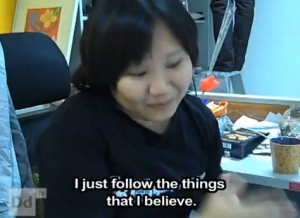Chiranuch Premchaiporn (known to friends as Jiew), editor of Prachatai.com, has been charged in court by authorities in Thailand for violating the country's Computer Crimes Act. Prachatai, which means ‘Free People’, is an independent web portal in Thailand.
An overview of the case is provided by FACT (Freedom Against Censorship Thailand). Jiew is accused of allowing ten Lèse majesté [anti-royal family] comments to be posted on Prachatai’s public webboard.
She had already deleted the comments when she received a removal notice from the state, but this didn’t stop the authorities from arresting her last year. Jiew is facing 50 years in prison if found guilty.
Thailand has strict Lèse majesté laws, and the country is aggressive in blocking websites which are deemed insulting to the monarchy. Censorship intensified last year when a national State of Emergency was declared in response to the anti-government Red Shirt protests. It is estimated that at least 425,296 web pages are blocked in Thailand.
Jiew’s trial has been closely monitored by netizens, journalists and human rights advocates. Global Voices Advocacy has daily reports of Jiew’s five trial sessions held this month, written by CJ Hinke – days one, two, three, four, and five. The next trial date has been postponed to September 2011.
Why is Jiew's case important? She is being prosecuted not for something that she wrote in her website but for comments posted by other people. CJ Hinke explains why Jiew's trial is a landmark issue in Thailand:
Chiranuch’s case is a landmark for the climate of free expression in Thailand. What is decided by this court will determine whether we live in a democracy governed by human rights and civil liberties or whether we are governed by a military junta at their whim.
Southeast Asia blog New Mandala has posted an interview with Jiew about her views on the state of media in Thailand:
When we talk about press freedom in Thailand, it’s quite controlled by the state and being manipulated by the entertainment business and the corporates. If you talk about news and politics, we cannot show as much criticism, about what the government did, right or wrong. Most of the media in Thailand is owned by the military or by the state. This is a problem of ownership
Thai Netizen Network is proposing an amendment to the Computer Crimes Act which is being used to stifle media freedom in the country:
… as we saw that the enforcement of this law would result in depriving people’s right to freedom of expression, which is fundamental for democracy. Furthermore, this law contradicts the characteristics of the Internet in many aspects, thereby allowing abusive enforcement. However, the government has never realised and taken this issue seriously to amend this freedom-infringing law.
The FreeJiew blog has been created to support the legal battle of Jiew.








2 comments